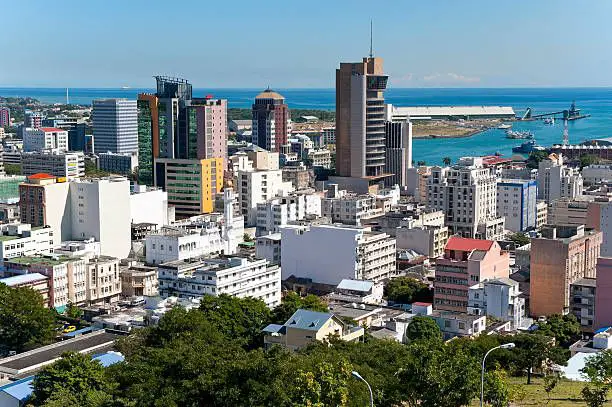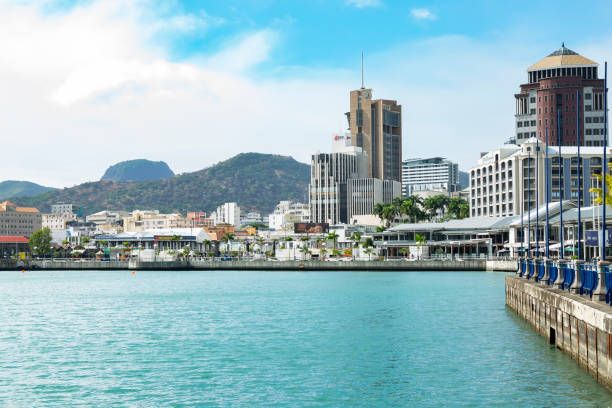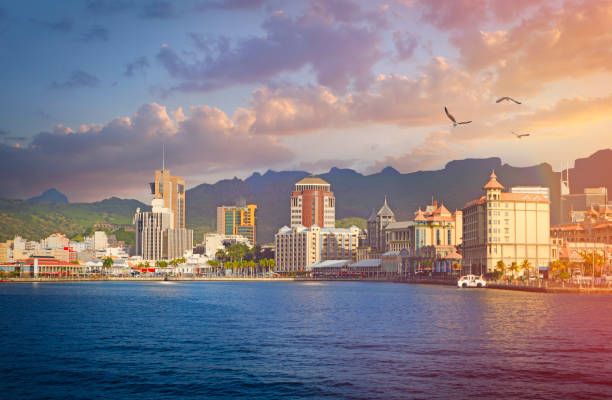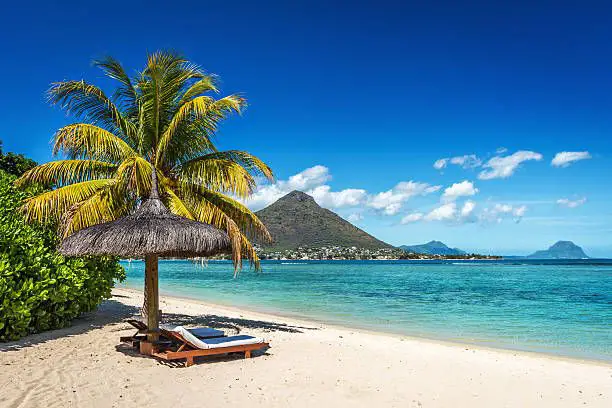Mauritius Digital Nomad Visa: One Of The Cheapest

Mauritius is a small island nation located off the coast of Africa in the Indian Ocean. Despite its size, Mauritius is quickly gaining recognition as a prime destination for digital nomads, with its breathtaking beaches, lush scenery, and vibrant culture.
And now, with the introduction of the Mauritius Digital Nomad Visa, the country is becoming even more attractive to remote workers looking for a new place to call home.
The Mauritius Digital Nomad Visa was officially launched in January 2021, and it offers remote workers the opportunity to live and work in Mauritius for up to one year.
This visa is specifically designed for digital nomads who work online and do not require a physical presence in their home country.
To be eligible for the visa, applicants must have a monthly income of at least $1,500 and provide proof of health insurance coverage for the duration of their stay.
One of the most appealing aspects of the Mauritius Digital Nomad Visa is that it provides remote workers with a relatively low-cost option for living and working in a beautiful location.

The cost of living in Mauritius is generally lower than in many other popular digital nomad destinations, such as Bali or Chiang Mai.
Additionally, the visa application fee is only $100, making it an affordable option for those on a budget.
Beyond the financial benefits, the Mauritius Digital Nomad Visa also offers remote workers the opportunity to experience a unique and vibrant culture.
Mauritius is known for its diverse population, with influences from India, Africa, and Europe.
This diversity is reflected in the cuisine, music, and art, making it an ideal destination for those who want to immerse themselves in a new culture.
For those who love the outdoors, Mauritius is an absolute paradise. The island boasts stunning beaches, crystal-clear waters, and lush forests.

Whether you enjoy hiking, water sports, or simply lounging on the beach, Mauritius has something to offer everyone.
One of the most significant benefits of the Mauritius Digital Nomad Visa is that it provides remote workers with a sense of stability and security.
With the visa, remote workers can feel confident that they have the legal right to live and work in Mauritius for up to one year, without worrying about visa runs or other logistical challenges.
In conclusion, the Mauritius Digital Nomad Visa is an excellent option for remote workers who want to live and work in a beautiful location while experiencing a unique culture.
With its low cost of living, stunning scenery, and diverse population, Mauritius is quickly becoming a top destination for digital nomads.
If you are a remote worker looking for a new adventure, consider applying for the Mauritius Digital Nomad Visa and see all that this beautiful island nation has to offer.
Eligibility criteria

The Mauritius Digital Nomad Visa is designed to attract remote workers to the island nation and promote the country's digital economy.
To be eligible for the visa, applicants must meet certain criteria, including:
- Remote Work: Applicants must be able to demonstrate that they are engaged in remote work and can perform their job duties from anywhere in the world using a computer and an internet connection.
- Income: Applicants must have a minimum monthly income of $1,500 or its equivalent in any foreign currency.
- Health Insurance: Applicants must provide proof of valid health insurance coverage for the entire duration of their stay in Mauritius.
- Criminal Record: Applicants must not have any criminal convictions or pending criminal cases in any country.
- Passport Validity: Applicants must hold a passport that is valid for at least 6 months beyond their intended stay in Mauritius.
- Return Ticket: Applicants must provide proof of a return or onward ticket to a destination outside Mauritius.
- Accommodation: Applicants must provide proof of accommodation for their stay in Mauritius, such as a hotel reservation or rental agreement.
It's important to note that meeting the eligibility criteria does not guarantee approval of the visa application.
The decision to grant the visa is at the discretion of the immigration authorities in Mauritius, and applicants may be required to provide additional documentation or undergo an interview as part of the application process.
How to apply

If you are a remote worker interested in applying for the Mauritius Digital Nomad Visa, here is a step-by-step guide on how to do it:
- Check eligibility: Before applying for the visa, make sure that you meet all the eligibility criteria, such as having a monthly income of at least $1,500, valid health insurance coverage, and no criminal record.
- Gather required documents: You will need to provide several documents as part of your application, including a copy of your passport, proof of income, health insurance coverage, accommodation reservation, and a return or onward ticket.
- Apply online: The application for the Mauritius Digital Nomad Visa can be submitted online through the government website. You will need to create an account, fill out the application form, and upload all the required documents.
- Pay the fee: The visa application fee is $100 and can be paid online through the government website.
- Wait for approval: Once you have submitted your application and paid the fee, you will need to wait for a decision on your application. Processing times may vary, but it typically takes around 10 business days to receive a response.
- Obtain the visa: If your application is approved, you will receive an e-visa that you can print and carry with you when traveling to Mauritius. You will also need to provide proof of your e-visa and other required documents to immigration officials upon arrival in Mauritius.
It's important to note that the Mauritius Digital Nomad Visa is valid for up to one year, and you can apply for an extension if you wish to stay longer.
However, you must leave the country and re-enter before the end of the initial one-year period to renew your visa.
Benefits of living in Mauritius as a digital nomad

Mauritius is a small island nation located in the Indian Ocean that offers a variety of benefits for digital nomads looking to live and work remotely.
Here are some of the key benefits of living in Mauritius as a digital nomad:
- Low Cost of Living: Compared to many other popular digital nomad destinations, Mauritius has a relatively low cost of living. Accommodation, food, and transportation are generally affordable, which can help stretch your budget further.
- Beautiful Scenery: With its pristine beaches, crystal-clear waters, and lush green forests, Mauritius is a paradise for nature lovers. The island offers a range of outdoor activities, from hiking and snorkeling to swimming with dolphins.
- Safe and Stable: Mauritius is a peaceful and stable country with a low crime rate, making it a safe destination for digital nomads. The local population is friendly and welcoming, and the government has taken measures to make the island a desirable place for remote workers.
- Fast Internet: The island has invested in high-speed internet infrastructure, making it easy for digital nomads to stay connected and work efficiently from anywhere on the island.
- Multicultural and Multilingual: Mauritius is a multicultural and multilingual society, with a diverse mix of African, Asian, European, and Middle Eastern cultures. English is widely spoken, along with French and Creole, making it easy for digital nomads to communicate with locals.
- Tax Benefits: Mauritius offers a favorable tax environment for digital nomads. There is no personal income tax for non-residents, and the corporate tax rate is relatively low, making it an attractive location for entrepreneurs and remote workers.
- Relaxed Lifestyle: Mauritius has a laid-back and relaxed lifestyle, which can help digital nomads reduce stress and achieve a better work-life balance. The island's natural beauty and peaceful atmosphere make it easy to unwind and recharge after a busy workday.
Overall, living in Mauritius as a digital nomad can provide a unique and rewarding experience, with a mix of adventure, culture, and relaxation.
The island's natural beauty, friendly locals, and favorable tax environment make it an ideal destination for remote workers looking to live and work in a beautiful and welcoming environment.
Cost of living in Mauritius

The cost of living in Mauritius is generally lower compared to many other popular digital nomad destinations. However, the actual cost of living will depend on your lifestyle, accommodation preferences, and personal expenses.
Here is a general comparison of the cost of living in Mauritius compared to other digital nomad destinations:
1. Thailand: Thailand is a popular digital nomad destination known for its affordable cost of living. However, over the past few years, the cost of living in Thailand has increased due to the growing popularity of the country as a remote work destination.
While it is still possible to live on a budget, the cost of accommodation, food, and transportation has gone up in popular cities such as Bangkok and Chiang Mai.
2. Bali: Bali is another popular digital nomad destination, known for its beautiful beaches, vibrant culture, and affordable cost of living.
The cost of accommodation, food, and transportation in Bali is generally lower compared to many other destinations, but prices have increased in recent years due to the island's popularity as a remote work destination.
3. Portugal: Portugal is becoming an increasingly popular destination for digital nomads, with cities such as Lisbon and Porto offering a mix of culture, history, and modern amenities.
The cost of living in Portugal is generally lower compared to many other European countries, with affordable accommodation and food options.
4. Mexico: Mexico is a popular destination for digital nomads due to its affordable cost of living, beautiful beaches, and vibrant culture.
The cost of living in Mexico varies depending on the location, with cities such as Mexico City and Playa del Carmen offering a mix of affordability and modern amenities.
5. Mauritius: While Mauritius may not be as well-known as some of the other digital nomad destinations, it offers a lower cost of living compared to many popular locations.
Accommodation, food, and transportation are generally affordable, and there are plenty of free or low-cost activities to enjoy, such as hiking and visiting local markets.
Overall, Mauritius offers a lower cost of living compared to many other digital nomad destinations, making it an attractive location for remote workers looking to stretch their budget while enjoying a beautiful and welcoming environment.
Pros and cons of the Mauritius digital nomad visa

The Mauritius digital nomad visa offers several advantages and disadvantages compared to other similar visas in different countries. Here are some pros and cons to consider:
Pros:
- Fast Processing: The Mauritius digital nomad visa has a fast processing time, with applications usually processed within 5-7 days.
- Long Duration: The visa is valid for up to one year, which is longer than some other digital nomad visas that are valid for only a few months.
- Renewable: The visa is renewable, so digital nomads can extend their stay in Mauritius for longer periods if they wish.
- Low Cost: The cost of the Mauritius digital nomad visa is relatively low compared to similar visas in other countries.
- Tax Benefits: Mauritius offers a favorable tax environment for digital nomads, with no personal income tax for non-residents.
Cons:
- Strict Eligibility Criteria: The eligibility criteria for the Mauritius digital nomad visa are quite strict, with applicants required to provide proof of income and health insurance.
- Limited Job Opportunities: While there are some job opportunities for digital nomads in Mauritius, the job market is relatively small compared to other countries.
- Limited Networking Opportunities: Due to the small size of the island, there may be limited networking opportunities for digital nomads looking to connect with other remote workers or entrepreneurs.
- Limited Infrastructure: While Mauritius has invested in high-speed internet infrastructure, it may not be as advanced as some other digital nomad destinations.
- Limited Cultural Diversity: Mauritius is a relatively homogenous society, so digital nomads looking for a diverse cultural experience may find it limited compared to other destinations.
Overall, the Mauritius digital nomad visa offers several advantages, such as fast processing, a long duration, and favorable tax environment, but it also has some limitations, such as strict eligibility criteria and limited job and networking opportunities.
Digital nomads should carefully consider their individual needs and preferences when evaluating whether the Mauritius digital nomad visa is the right option for them.
Exploring the unique culture and attractions of Mauritius

Mauritius is a unique and diverse island nation located in the Indian Ocean. It has a rich history and culture, influenced by its colonial past and multiethnic population.
In addition to its beautiful beaches and crystal-clear waters, Mauritius has a lot to offer in terms of cultural attractions and experiences.
Here are some of the unique cultural experiences and attractions you can explore in Mauritius:
- Aapravasi Ghat: A UNESCO World Heritage Site, the Aapravasi Ghat is a complex of buildings that served as a transit point for indentured laborers brought from India to Mauritius in the 19th century. Today, it serves as a museum and memorial to the thousands of immigrants who arrived on the island.
- L'Aventure du Sucre: This museum tells the story of the sugar industry in Mauritius, which has played a significant role in the island's history and economy. Visitors can learn about the process of sugar production and its impact on the island's culture and society.
- Champs de Mars Racecourse: Located in Port Louis, the Champs de Mars Racecourse is the oldest horse-racing track in the Southern Hemisphere. It's a popular attraction for locals and tourists alike, with races held every Saturday during the racing season.
- Hindu Temples: Hinduism is the largest religion in Mauritius, and the island is home to many beautiful temples that are worth visiting. The Grand Bassin, also known as Ganga Talao, is a sacred lake and pilgrimage site for Hindus, and the Sagar Shiv Mandir is a unique temple built in the shape of a boat.
- Sega Dance: Sega is a traditional Mauritian dance and music style that originated among the island's African slaves. Today, it is a popular cultural expression and is often performed at festivals and events.
- Street Food: Mauritius is known for its delicious street food, influenced by its diverse population and colonial history. Some popular dishes include dholl puri (a flatbread filled with lentils and served with curry), samosas, and gateaux piments (chili fritters).
- Nature Reserves: Mauritius is home to several nature reserves that offer a unique glimpse into the island's diverse flora and fauna. The Black River Gorges National Park is a popular destination for hiking and wildlife spotting, while the Ile aux Aigrettes Nature Reserve is a protected island home to rare bird species and giant tortoises.
Overall, Mauritius offers a unique blend of culture, history, and natural beauty that is worth exploring for digital nomads looking to experience something new and different.
From its museums and temples to its street food and nature reserves, there is something for everyone in this diverse and welcoming island nation.
